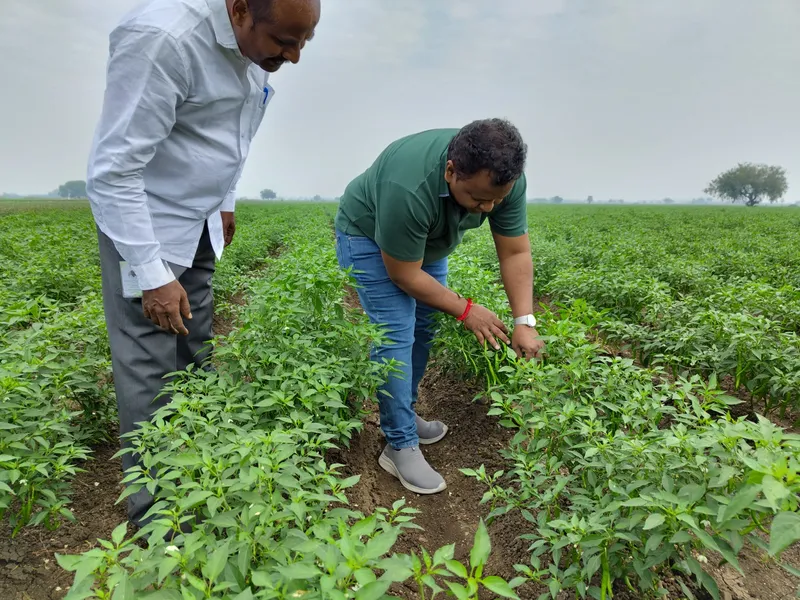These entrepreneurs are helping spice farmers get better prices and quality output
Krishikan is an agritech startup that aims to improve the quality of spices produced by farmers by providing the right inputs.
Having closely watched how agriculture was practised in their childhood days, Raj Kancham and Vivek Radhakrishnan always had the urge to do something that would uplift the entire agri ecosystem—from farmers to the end consumers.
The duo started in 2020 that focuses on the spices segment. The Bengaluru-headquartered agritech startup is engaged with the complete value chain, i.e., the farmers, agri input providers, research institutes, and buyers.
Kancham had previously worked with companies such as Nokia, GE, and Honeywell, and Radhakrishnan was with PSI Data Systems and Sapient. Prior to the founding of Krishikan, both had the experience of working with other agri startups.
“I have closely watched how agriculture is practised, and there are a lot of challenges around sowing, harvesting, and selling,” says Kancham.

Focus on spices
The founders decided to focus on the spices segment for a couple of reasons. These include low output volume, but high value.
The founders observed that farmers were continuing with their traditional practices, which were not beneficial to them either in terms of output or prices.
According to Kancham, more than getting the right seeds for the crop, it is important to check on the nutrient value of the land.
“The level of organic carbon in the soil is the heart of everything, and it is much more important to provide the right inputs,” he says. “Farmers are more focused on plant health than soil health,” he adds.
Krishikan is constantly engaged with various research institutes in the country to know about the latest advances in spice cultivation, which are then given as inputs to the farmers.
For this, Krishikan has built linkages with various companies in terms of procuring seeds, fertilisers, nutrients, etc.
The startup engages with various farmer groups to guide them on quality inputs like seeds, optimal use of fertilisers, disease management, etc. Kancham claims that the farmers on the platform have reduced their input costs by a minimum of 20% and have also increased their productivity in the range of 12-35%.
The team also constantly interacts with over 5,500 farmers to help them closely monitor the crop, as well as provide them with timely inputs or advice. This is done through its internal web-based application, accessible through mobile phones.
Challenges
Kancham says the business is also very challenging as the farmer community is used to following traditional practices, and there is scepticism when somebody tells them something new. Added to this, the technology adoption rate is very low.
Krishikan founders believe one needs to be patient while discussing new ideas and practices with farmers. The team ensures they are careful not to suggest radical changes, but only those aligned to what the farmers have already been doing but with certain improvements.
In this entire process, Krishikan is also constantly gathering factual and ground-level data.
“In the last two years, we are in the data collection mode on various parameters and we will look at modelling this sometime in the near future,” says Radhakrishnan.
Supply chain
Apart from giving inputs to farmers, the startup also purchases the spices produced by these farmers.
Kancham says spices are an important ingredient in many medicines, and a good number of buyers are keen to source quality spices and are willing to pay a premium price.
Krishikan has joined hands with various buyers such as food processing companies, exporters, and pharmaceutical companies.

Chilli crop being inspected by Krishikan team
Kancham says, in the export market, there are stringent regulations on the residue levels in spices, and Krishikan can bring this down to acceptable standards. It has managed to increase the exportability from 60% to 80% of its produce.
“The industry gets predictability on what is grown and also the quality and consistency,” says Kancham.
Today, Krishikan is mainly engaged with two spice crops—chilly and turmeric. It is present across three states—Karnataka, Andhra Pradesh, and Telangana, and has partnered with around 5,500 farmers spanning about 10,500 acres.
The biggest competition for Krishikan is the existing middlemen in the spice business. Other startups present in their category include Dehaat and FarMart. However, the founders say their focus on the spices segment gives them an edge unlike their competitors for whom spice just is another category in their portfolio.
The startup has plans to expand into other spices segments like black pepper, cumin, garlic, ginger, etc.
The market and business model
According to India Brand Equity Foundation (IBEF), India is the world’s largest spice producer. It is also the largest consumer and exporter of spices. Spice production in 2021-22 stood at 10.88 million tonnes. During 2020-21, the export of spices reached an all-time high both in terms of value and volume by registering a growth of 17% in US dollar terms and 30% in volume.
During 2021-22, the single largest spice exported from India was chilli, followed by spice oils and oleoresins, mint products, cumin, and turmeric, said the IBEF report.
While Krishikan provides free services to the farmers, it makes money from the input providers, as well as the customers who buy the produce.
The bootstrapped venture has a team of around 30 people and has raised a small angel funding round. It is also actively scouting for a venture round.
Kancham says, “One cannot build relationships with the farmers unless you speak in their language, where we give them valuable inputs and not some generic knowledge.”
Edited by Megha Reddy









